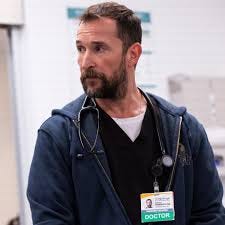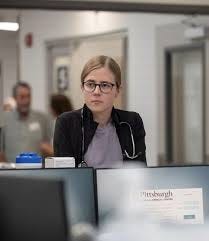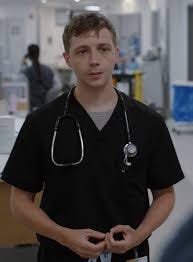In a deluge of content it’s hard to know what to watch or even know what’s on the menu. There are shows that come out and do extremely well that people like you and me have never heard of. There are shows in their tenth season that I thought were a blip on the radar. And there are shows that break into my world just a little bit and I think…could that actually be any good?
This is how I felt about Max’s The Pitt. In all honesty, I thought it was called “the Pit,” when I first heard about it on the Who?Weekly patreon podcast. It was described as a show about a single day in an emergency department. I happen to know from being only one season behind on Grey’s Anatomy that “the pit” is a term for the emergency department of a hospital. Little did I know there was a play-on-words afoot. Cause baby, this thing takes place in Pittsburgh.
You actually mostly don’t know it takes place in Pittsburgh except for when Dana (Katherine LaNasa) talks (pictured below).
This girlie keeps that thing on her, and by that thing I mean a yinzer accent, a heart of gold, and a pack of pall malls. She is a true delight and something happened to her at the end of the last episode that I won’t spoil but that I do wish to seek vigilante justice for…
I digress.
It’s called The Pitt. It’s an emergency department in Pittsburgh. You get it.
When presented with a show the three following items in its description, a) potentially gimmicky premise (one day split up over the course of an entire season); b) a medical drama; and c) a (seemingly) straight man lead, I was out.
I’m rarely charmed by gimmicks, I’ve been to hell and back again thanks to my fandom of Grey’s, and I’m fundamentally bored by stories about straight men.
I can’t even tell you why I first pressed play on Monday night. But I went to bed with five (six?) episodes under my belt. I caught up on Tuesday night. And I’m writing this on Wednesday waiting with the shakes until I get my hands on the next episode, which will be out by the time you’re reading it.
Whereas many medical shows focus on the more exciting, never-seen-before, medical miracle (or tragedy) cases, The Pitt focuses on the mundane. Car accident, car accident, dangerous fall, frat boy incident, hate crime, sickle cell emergency, problems deriving from the inaccessibility to necessary medication, abortion. This list of problems may seem harrowing, but it doesn’t approach after-school special as much as it reflects the actuality of urban emergency departments.
Emergency care is, for many, primary care. It is many people’s only access to a doctor. This show does not shy away from that, but it doesn’t hold your hand and teach you about that (generally…there are moments, as is always the case in medical shows). To me, it is much more of a show about the interactions of vulnerable and stressed people, the kindness (and lack thereof) of ostensible strangers, and the bond that working toward a capital “G” Good can establish than it is about medicine. It just happens to take place in a hospital.
Though the promotional material I’ve seen about the show makes it seem that Dr. Robinavitch (Noah Wyle; pictured above)—everybody calls him Dr. Robby—is the focal point of the show, this truly is an ensemble show at its heart. Some of the actors may look a little familiar—one of the doctors is played by the actress who played Chloe in Season 2 of American Vandal, for example)—but they are really character actors who are newcomers to this caliber of program (seemingly wide-reaching, broadly appealing, prestige-adjacent). And in The Pitt (and its setting, The Pit), they shine.
To me, this approaches the feeling that Grey’s Anatomy had when it actually was a show about underdogs and not world-renowned surgeons. The doctors (and nurses! nurses with personality and agency!) are scrappy and imperfect, but are clearly compassionate. They are uniquely flawed and conceptualized, though some do play into common tropes (hothead with a heart of gold; unconventional doctor whose methods work; feisty surgeon; aren’t-you-too-young-to-be-a-doctor doctor; a former attending/resident relationship that still has a certain will-they-won’t-they je ne sais quoi).
The characters have senses of humor and tempers that are real, even if a bit on-the-nose at times. Besides, the naturalistic acting style makes up for any heavy-handedness in spades.
The “gimmick” of the show—that each episode is an hour of real time events—is oversold. Yes, that is the truth of the show and the show holds to that internal logic. But that rarely comes into play. More than anything, it allows for more careful development of multiple events, cases, storylines, tension, and character development in each episode.
The show is set up so that we are not likely to just follow one character because an hour in the life of a single doctor would be boring. They run labs and review charts and take piss breaks and eat snacks and go on a smoko. It’s not all tracheotomies and running codes. Granted, they do run a lot of codes in The Pitt.
Plus, there’s something really refreshing about seeing the same people from the same cases over the course of multiple episodes. There are one-episode guest spots, but more often than not, we actually have the time to take in these characters and learn about them. This makes the show more human than many other medical dramas.
And finally. The straight man of it all. Well, folks. There’s a patient who won’t stop calling Dr. Robby a “fruitcake” and at one point some other homophobic line I just can’t remember. So uhhh. You tell me.
But in all seriousness, because the show is a true ensemble, it focuses as much on the potential sexual chemistry of two women doctors, the inner lives of those women, the experiences of the doctors of color, and on the issues that queer patients face, than just one allegedly straight dude.
Besides, that presumably straight dude actually has some history to grapple with. Central to his story is that he is grieving the loss of his mentor, a former doctor at his hospital. The day this season focuses on is the anniversary of his death.
In a sense, this is The Bear but instead of Chicago it’s Pittsburgh and instead of a beef joint it’s an emergency department.
Oh and instead of Fak, this is our babygirl.
Her name is Dr. Mel King (Bryan Cranston’s daughter Taylor Dearden). If you say something bad about her, we will have a problem.
Oh also him.
That sweet lil baby boy is med student Dennis Whitaker (Gerran Howell) and he is an angel. That’s also his fourth (fifth?) pair of scrubs I think? In the span of one day! Why? Because medicine is messy. As are the internal lives of doctors and nurses…okay, you get it.
The point is. This show absolutely rules and I beg you to give it a try.
Thanks!
Love you (Allegedly).








